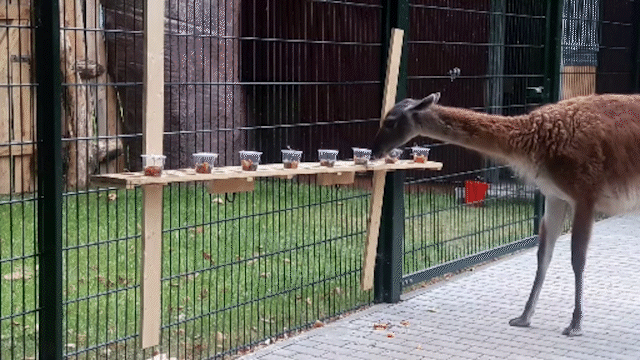Outsider Animals May Be the Best at Solving Problems
Researchers tested whether hoofed mammals could retrieve food from a lidded cup, and those lower in the pecking order were the most successful

Hoofed animals that are outsiders in their social groups may have better problem-solving skills than their peers, new research suggests.
In a study published this month in Proceedings of the Royal Society B, scientists set up a puzzle that required ungulates, or hoofed mammals, to retrieve treats from plastic cups covered with a lid. They tested 111 zoo animals of 13 ungulate species, including domesticated ones like dromedary camels, goats and sheep, as well as non-domestic ungulates, such as giraffes, impalas and Przewalski’s horses—the last truly wild horse in the world.
The mix of subjects was important, because similar studies had often focused on only one species—and rarely on ungulates, lead researcher Álvaro Caicoya, a psychologist at the University of Barcelona, tells Sheena Goodyear of CBC Radio.
Overall, 36 percent of the study subjects successfully retrieved food at least once. Some individuals did not even attempt the task, though, and participation varied among species—100 percent of camels approached the cups, for example, while only 33 percent of the sheep did. Camels and goats were the most successful in retrieving the food, with 86 and 69 percent managing to open the cups, respectively, per the study. Scientists are not sure why these two species were the top food-getters.
“They are domestic animals, so maybe they are more used to human things,” Caicoya tells CBC. “But also [sheep] are domestic animals, and they are not very good at solving the tasks, so we cannot rely on that to be an explanation.”
On an individual level, researchers found that an animal’s social status affected both its willingness to complete the task and its success at removing the food from the cup. To determine an individual’s place in the pecking order, the team recorded the proximity between animals in each group at 100 times over several days.
They also tested the animals’ neophobia, or fear of new things, by placing familiar food near something unfamiliar, like a plastic bowl. Being apprehensive of new things could stop an animal from innovating.
Across all species, individuals that were less neophobic and less socially integrated were most likely to retrieve the snacks.
“If you’re not well integrated into your social group, you can’t count on friends providing you with support or sharing resources with you, and you have to count on yourself much more,” co-author Federica Amici, a biologist at the University of Leipzig in Germany, tells New Scientist’s Christa Lesté-Lasserre. “It’s interesting that problem-solving skills appear to be quite an alternative to social skills.”
It’s also possible that these loners aren’t social outcasts but rather are more autonomous individuals that don’t need their group, because they can figure things out by themselves, Martine Hausberger, an animal scientist at the University of Rennes in France who was not involved in the study, tells New Scientist.
The study “is a great way to understand the cognition that underlies a particular behavior across species,” Joshua Plotnik, a comparative psychologist at Hunter College who was not involved in the work, tells the New York Times’ Veronique Greenwood.
Overall, learning more about these understudied ungulates may help us better understand our own behavior, Caicoya tells CBC.
“I think that this kind of study teaches us that these animals with hooves … are pretty intelligent animals, and we should really pay attention to them, and really study them more,” he tells the publication. “They can teach us a lot about how we think, how we behave and how we resolve problems.”
/https://tf-cmsv2-smithsonianmag-media.s3.amazonaws.com/accounts/headshot/MargaretOsborne.png)
/https://tf-cmsv2-smithsonianmag-media.s3.amazonaws.com/accounts/headshot/MargaretOsborne.png)